
Pin on Weired News
The data comes from the Pew Research Center and it shows that Christians make up 50.9% of Africa's population, followed by Muslims at 43.3% and others with 5.8%. It's important to note that the reality on the ground is much more complicated than this map would have you think. The map just shows what religion is predominant in a given area.

Places where Muslims live in Africa source davidwhiting.today
African Traditional Religions. FOUNDED: 200,000-100,000 b.c.e. RELIGION AS A PERCENTAGE OF WORLD POPULATION: 1.3 percent OVERVIEW. Africa, the place of origin of all humankind, is divided into numerous political and cultural regions, reflecting its diverse range of histories, ethnicities, languages, beliefs, attitudes, and behaviors.

Economic Geography, Important Facts, Central African, Political Science
Afe Adogame, "Practitioners of indigenous religions in Africa and the African diaspora," in Religions in focus: New approaches to tradition and contemporary practices (ed. Graham Harvey; London.
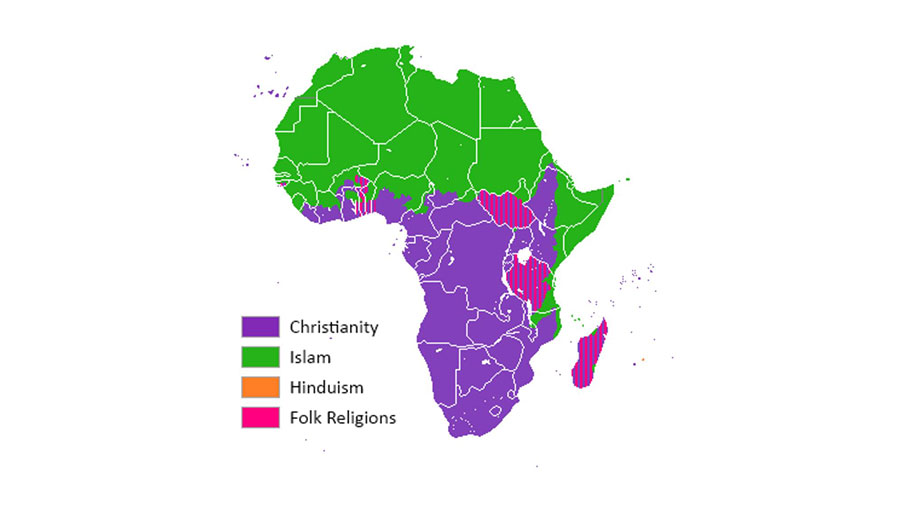
Religions In Africa 1900 Today. Why Are Africans Poor?
Map showing different Regions and their predominant religion . ANCIENT BELIEFS. Africa has no single body of religious practice and belief that can be identified with the continent. Although religion in Africa is quite multifaceted, it has had a great effect on the art, culture, and philosophy of the African people. The African continent is.
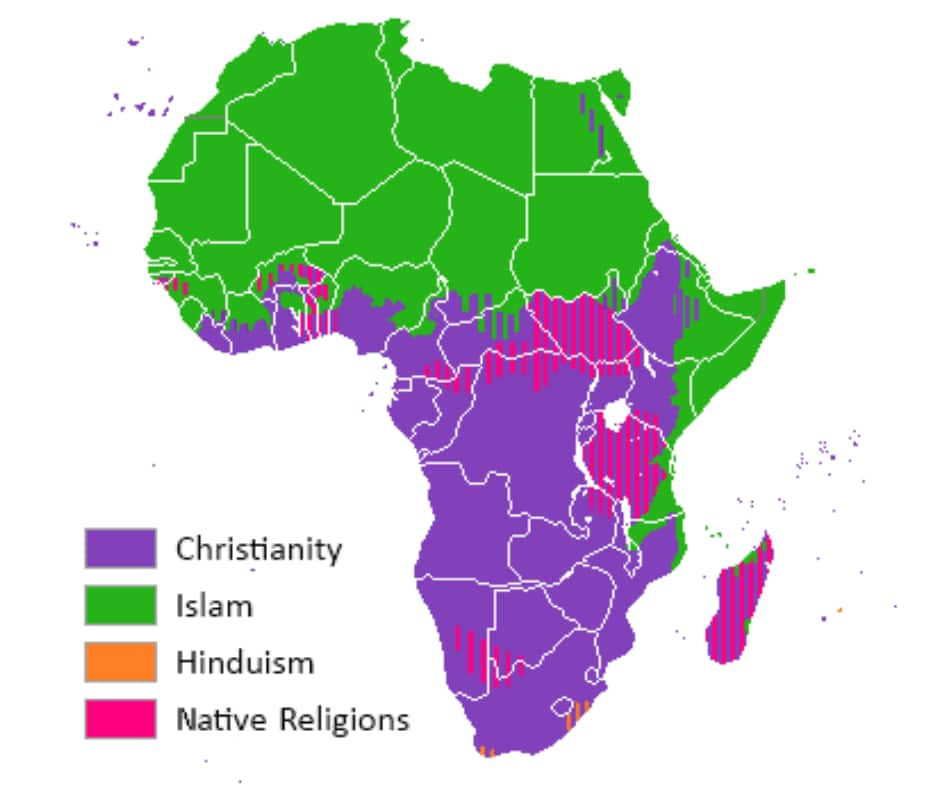
List of major religions in Africa Tuko.co.ke
Category: Religion maps of Africa. From Wikimedia Commons, the free media repository. Jump to navigation Jump to search. Media in category "Religion maps of Africa" The following 24 files are in this category, out of 24 total. Africa (Volume I) pg 50.jpg 1,804 × 2,084; 1.09 MB.
Map of religion in africa but i have no data (includes data for both
The remaining population of Namibia follows various indigenous religions. 9. Swaziland. Christianity is also the most common religion in Swaziland. Over 40% of the population is affiliated to the Protestant and indigenous African churches. About 20% of the population are Roman Catholics.
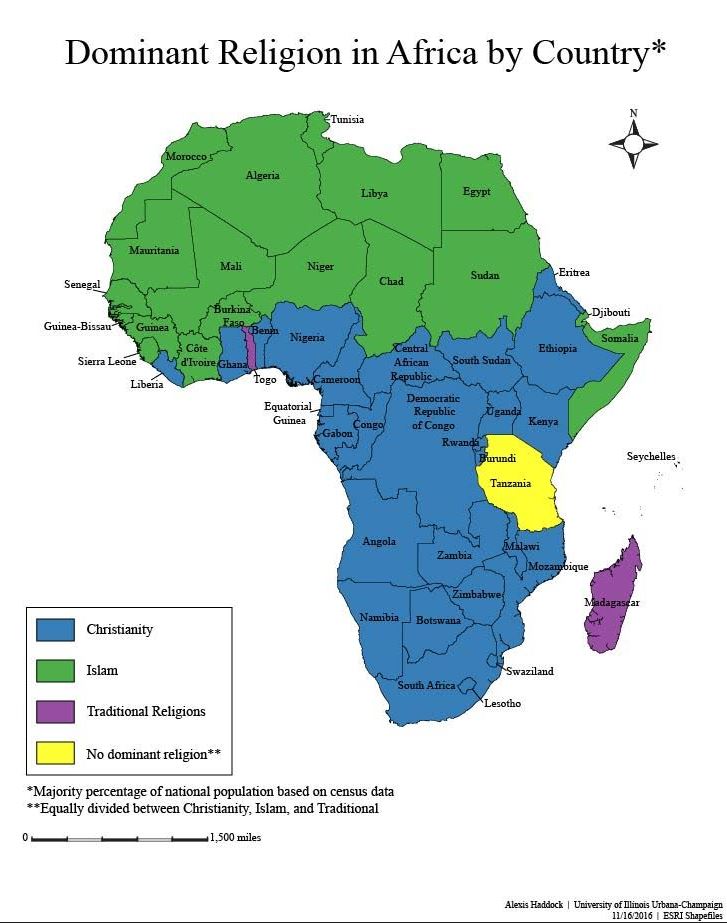
Dominant Religions in Africa Africa Fan Art (41305256) Fanpop
West African Vodun. Vodun (meaning spirit in the Fon, Gun and Ewe languages, pronounced [vodṹ] with a nasal high-tone u; also spelled Vodon, Vodoun, Vodou, Vudu, Voudou, Voodoo, etc.) is a religion practiced by the Aja, Ewe, and Fon peoples of Benin, Togo, Ghana, and Nigeria . Elements of the West African religion have survived and evolved.

Opiniones de Religión en África
African religions, religious beliefs and practices of the peoples of Africa.It should be noted that any attempt to generalize about the nature of "African religions" risks wrongly implying that there is homogeneity among all African cultures.In fact, Africa is a vast continent encompassing both geographic variation and tremendous cultural diversity.

Pin on AFRICA
African studies quarterly. (Online): "Religion and philosophy in Africa" (1998) Vol. 1, issue 4. -- Gainesville, Florida: University of Florida, Center for African Studies. Current and recent news in brief on Africa in English or French from African newspapers and journals, the Pan African News Agency (PANA), UN news services, and non-African.

the world map shows where people are living in each country
AFRICAN RELIGIONS: AN OVERVIEW Prior to the coming of Christianity and Islam to Africa, the peoples south of the Sahara developed their own religious systems, and these formed the basis of much of their social and cultural life. At present the indigenous religions, modified by colonial and postcolonial experience, continue to exist alongside Christianity and Islam and to play an important role.

Religious map of Africa Topographical Depiction Pinterest Africa
Previously, we brought you "11 Maps to Help You Make Sense of World Religion," "13 Insightful Maps of U.S. Religion," and "10 Revealing Maps of Religion in Europe."We even brought you "24 Crazy Facts About Global Christianity in the 21st Century"! Today, we're zeroing in on that great place of exponential growth in the Christian faith: Africa.

Religions in Africa Mappr
EAST AFRICAN RELIGIONS: AN OVERVIEW East African religions do not form a single coherent body of beliefs and practices. They show great diversity in myths and cosmologies and in beliefs about the nature of spiritual powers; in kinds and authority of ritual experts; in the situations when ritual is performed; and in responses to the advent of Islam and Christianity.
Largest Religion Tradition in Africa [4800X4920] MapPorn
Basics. Highly complex animistic beliefs builds the core concept of traditional African religions. This includes the worship of tutelary deities, nature worship, ancestor worship and the belief in an afterlife, comparable to other traditional/nature religions around the world, such as Japanese Shinto or traditional European paganism.

15 facts on African religions AfroTide
Image Credit: A map of the Africa, showing the major religions distributed as of today. Map shows only the religion as a whole excluding denominations or sects of the religions, and is colored by how the religions are distributed not by main religion of country etc. By T.L. Miles via Wikimedia Commons via the Public Domain.

Most held religious beliefs in Africa maps Amazing maps, Africa map, Map
Religion in Africa (2022 estimate) [1] Christianity (49.0%) Islam (41.6%) Traditional faiths (8.2%) Other / None (1.2%) Religion in Africa is multifaceted and has been a major influence on art, culture and philosophy. Today, the continent's various populations and individuals are mostly adherents of Christianity, Islam, and to a lesser extent.

Pin on World History
OLUPONA: Yes, and the pluralistic nature of African-tradition religion is one of the reasons for its success in the diaspora. African spirituality has always been able to adapt to change and allow itself to absorb the wisdom and views of other religions, much more than, for example, Christianity and Islam. While Islam and Christianity tend to.